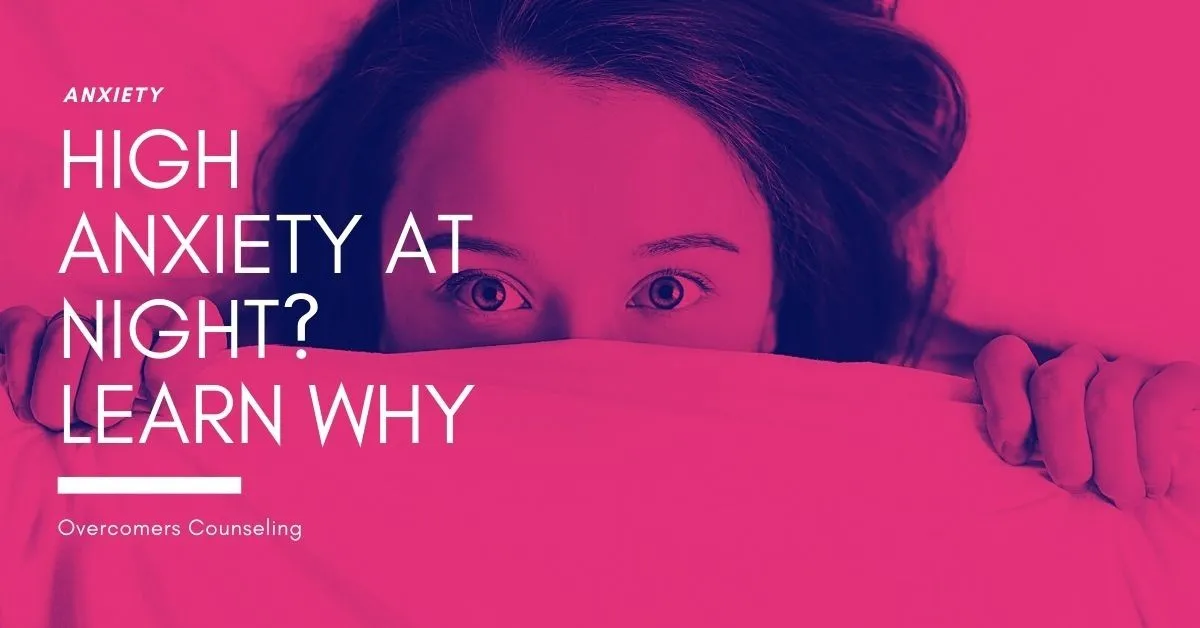People who live with anxiety may ask themselves why anxiety is worse at night? Sometimes, people feel more...

People who live with anxiety may ask themselves why anxiety is worse at night? Sometimes, people feel more anxiety in the evening hours simply because it is quiet, and they are finally alone with their thoughts. There are many distractions throughout the day: school, work, social interactions that may make it easier to ward off anxious feelings. However, when the world quiets down, it may be more difficult to reign in worry and uncertainty attributed to anxiety.
Sometimes, people may contribute to the cause of their nighttime anxiety. For instance, if you don't manage stressful situations throughout the day, they may creep back into your mind at night. As you face challenges throughout the day, try to solve problems at the moment to reduce the chances of worrying about it later that night. If a problem needs more attention, try to think of an effective plan for finding the answer so that you don't stew over the potential outcome.
It's not surprising that nighttime anxiety can impact your ability to sleep. Failure to get proper sleep can lead to a host of additional problems such as irritability, inability to focus, and the creation of poor sleeping habits. Over time, these issues can lead to even more significant health problems.
Some people experience anxiety more at certain times of the day. If you've noticed that your anxiety is worse at night, there is some comfort knowing there are some tips out there that may work to reduce it. If night anxiety keeps you awake, here are a few tips that may help.
Transition time is so important when you struggle with anxiety. As your day begins to wind down, allow yourself a few extra minutes to get through those last tasks of the day. For some people, piling on too many activities in the evening can make you feel anxious and overwhelmed. Give yourself more time to complete any work, and try to reduce your evening to-do list.
Make sure that your bedroom is a peaceful and comforting space for sleep. You may want to consider removing any distracting items such as a television or your cell phone. For some people, essential oils or meditation soundtracks may help create a calm atmosphere that allows you to destress and relax.
A routine can help you maintain control during the evening hours. Instead of allowing intrusive thoughts to enter your mind, you can simply focus on the tasks at hand. Establish a regular bedtime, limit your screen time before it, and include an activity that allows you to get into a restful headspace. Some people read or listen to music as a way to defuse their thoughts.
High anxiety at night can certainly wreak havoc on a person's everyday life. Understanding the source of your anxiety may go a long way in helping you find proper treatment. Many people know that they focus on their anxiety in the evening because they no longer have daytime distractions. Allowing yourself a transition time and creating an effective bedtime routine can go a long way in helping night anxiety.
Strategies for encouraging children to take calculated risks include starting small, highlighting the benefits, being supportive, teaching them to evaluate risk, emphasizing learning, celebrating success, and encouraging perseverance.
Some signs that trust is present in a relationship include feeling safe to be yourself, being able to rely on your partner, and feeling like you can share anything with them.
If you're looking to improve your emotional health in your relationship, there are a few key things that you can do. First, make sure that you're communicating openly and honestly with your partner. Second, make sure that you're respecting each other's needs and boundaries. Third, be willing to compromise when necessary. And fourth, always show kindness and understanding towards each other.
Yes, love can be rekindled in a marriage. It takes effort and commitment, but it's not impossible. By prioritizing communication, quality time, and showing appreciation and gratitude, it is possible to reignite the spark in your marriage.
It's possible for therapy to bring up difficult feelings or conflicts. However, this is often part of the process of resolving issues and improving your relationship. It's important to communicate with your therapist if you're finding sessions too difficult.
Signs that therapy is working can include improved communication, better conflict resolution, and increased relationship satisfaction. However, progress can sometimes be slow and it's important to be patient.